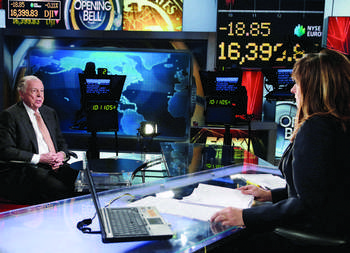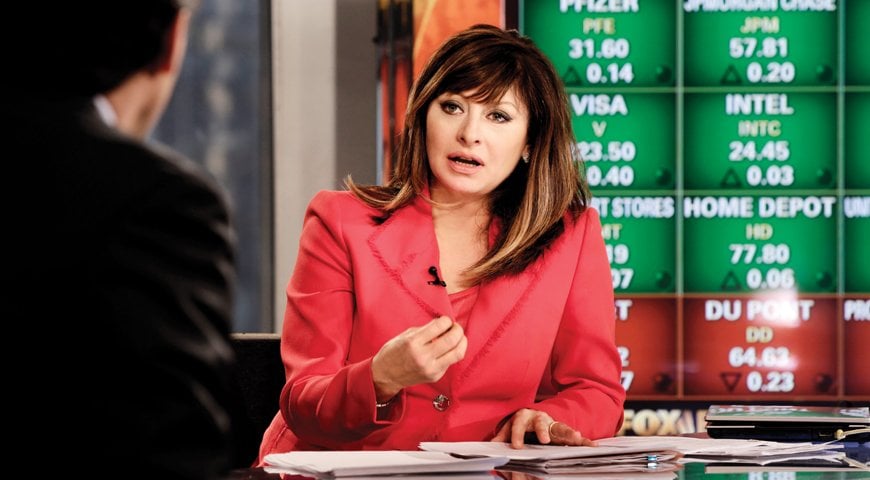Q: YOU WERE AT CNBC SINCE 1993. WHY LEAVE?
I did four five-year deals at CNBC. I loved what I was doing and I saw no reason to think about anything else. This [contract] time, I thought to myself, things have changed. I would say to my boss, “We are programming to an audience that has left the table—I don’t think that day traders are there watching buy/sell/hold, three-minute interviews.” He didn’t agree.
BUT THEY WANTED YOU BACK?
They offered me a great contract. But I started thinking about my own brand—what happens to Maria’s brand at the end of five years? “Oh, that woman—she’s still doing soundbite interviews.”
SO YOU WERE CHANGING, BUT CNBC WASN’T.
It’s nothing against the people at CNBC. I had the most unbelievable 20 years at CNBC.
AND THEN?
Then Roger Ailes came to me with an offer I just could not refuse.
WHAT’S DIFFERENT ABOUT WORKING AT FOX?
At CNBC I felt like I was always under pressure to have five people on at once and do shorter interviews. Here, I’m doing longer interviews. And the Sunday show has just been great—we’re knocking the cover off the ball in terms of ratings.

OTHER THAN RATINGS, WHAT’S THE BENCHMARK OF SUCCESS FOR YOU?
We’ve already had success—I’ve had guests on this show who have never walked into this building before. But right now, I’m not looking at the ratings of Fox Business Network. I’ve had a big challenge in terms of letting people know where I am.
MEANING, WHERE FOX BUSINESS NETWORK IS ON THEIR CABLE LISTINGS?
There is a population of people who don’t understand that Fox Business Network is a different network. They think it’s just the business part of Fox News. So I’m doing radio and social media—I’ve got four million followers on Google Plus. I’m sending them the channel guide, trying to get the word out.
WHEN FBN WAS LAUNCHED IN OCTOBER 2007, IT ATTRACTED A LOT OF ATTENTION, BUT IT HAS NEVER REALLY LIVED UP TO EARLY HYPE. WHAT DID YOU THINK OF FBN WHILE YOU WERE AT CNBC?
When I was at NBC and CNBC, I was just drinking the Kool-Aid, and I thought Fox Business Network was tiny. It’s not. CNBC is in 90 million homes, Fox Business Network is in 75 million homes.
LET’S TALK ABOUT YOUR STATUS AS A WOMAN IN A MALE-DOMINATED FINANCIAL CULTURE. YOU’RE FAMOUSLY KNOWN AS THE “MONEY HONEY.” AND FIVE YEARS AGO A VANITY FAIR PIECE ABOUT YOU AND THEN-CNBC REPORTER ERIN BURNETT SUGGESTED THAT THE TWO OF YOU WERE HAVING A “CATFIGHT.” DOES THIS SORT OF GENDER STEREOTYPING BOTHER YOU?
I understand that people love this whole story line, but it’s just not true. I never had a problem with anyone calling me what they wanted to call me when my back was turned. No one ever actually picks up the phone and says, “Hi, Money Honey?”

SO NONE OF THE OBSESSION WITH YOUR GENDER AND LOOKS HAS EVER GOTTEN UNDER YOUR SKIN?
When I first got to the Exchange, there was one guy who made my life miserable for a couple of months—he just didn’t want me down there. He would say things to me like, “This isn’t for your little TV show.” Silly remarks. That was the only time in my career when I could genuinely say someone gave me a hard time because of being a woman.
WHAT ABOUT WALL STREET GENERALLY? FINANCIAL CULTURE IS WIDELY CONSIDERED HOSTILE TO WOMEN IN DIFFERENT WAYS, FROM A GLASS CEILING AT INVESTMENT BANKS TO MALE BANKERS BONDING AT STRIP CLUBS. TRUE?
I’ve heard that. I’ve seen it in the movies. I’ve never witnessed it.

NEVER?
There was never, ever a situation that I can look you in the eye and say that happened, where I actually felt that they were undermining me, doing strip clubs, drugs, none of it.
LET’S TALK ABOUT FOX. THE NETWORK HAS A CONSERVATIVE POLITICAL IDENTITY, AND ROGER AILES IS VERY CLOSELY ASSOCIATED WITH THAT. WAS THAT A CONCERN FOR YOU?
I have been very dismayed by what’s going on in journalism. I feel that politics has seeped into journalism so badly, it’s very difficult to get the facts anymore. Because everybody has their bias, whether you’re on the right or on the left. The story is written through a political bias lens, and that’s not journalism, and it has saddened me.
INCLUDING FOX’S JOURNALISM?
Fox News has commentators, they have opinions. Those are the people at night on Fox primetime. I am here to do business news.
YOU MENTIONED THE MARIA BARTIROMO BRAND. HOW WILL THAT CHANGE?
I want [guests’] perception of me to be as a fair journalist who is not going to waste my time, not going to have me on for five minutes, but actually ask me the appropriate questions that viewers want answered because she’s done her work and prepared.
YOU MENTIONED THAT CNBC IS STILL TARGETING DAY TRADERS. HOW DO YOU DO SERIOUS LONG-TERM INVESTING JOURNALISM ON TV?
Increasingly you’re seeing this emphasis on wealth management and this de-emphasis of trading. Why? Because audiences want that. So how do you do it on television where you have a limited amount of time? We’re doing it. Have a longer conversation and don’t shortchange the conversation. Make sure that you’re talking about the long term.
THERE’S BEEN A LOT OF DISCUSSION RECENTLY ABOUT HOW TRANSPARENT WALL STREET IS. HAS IT BECOME MORE TRANSPARENT DURING YOUR TIME COVERING IT?
When you look at my career, over that 25-year period, you really have seen people get empowered, feel like they can make their own investment decisions, feel like they know more about the market. Is it perfect? No, and it may never be exactly perfect. But it certainly is much, much more transparent than ever before. And I think that has enabled firms like Schwab, TD Ameritrade, all these individual investor firms, to thrive, because people are making decisions on their own.
WHAT’S YOUR OPINION OF MICHAEL LEWIS’ ARGUMENT IN FLASH BOYS THAT, BECAUSE OF HIGH-FREQUENCY TRADING, THE MARKET IS “RIGGED”?
I don’t think the market is rigged. There are certain participants in the market who have figured out a way to navigate faster than other people, get in front of other people, all in the confines of legality. High-frequency trading is obviously now being looked at, you’ve got all these investigations going on. But I don’t think that the individual investor who’s looking to invest long-term is getting impacted. Because if you own a stock at $20, and you’re looking to own that stock for the next three years, do you care whether you got it at $20 and 1/4 or $20 and 1/8?
FOR THE FIRST TIME, YOU HAVE A SUNDAY TALK SHOW. WHY DOES THE WORLD NEED ANOTHER SUNDAY MORNING TALK SHOW?
At the end of the day, everything is about economic issues. But on a Sunday morning, you flip around and you see all these talking heads, politicos, talking talking points about our country. Very rarely do you see anyone connecting the dots—that it’s about the economy, it’s about job creation, it’s about growth. So that was my idea.
BOTTOM LINE: SO FAR, SO GOOD?
It was scary at first—I helped pioneer something at CNBC, I helped build that brand. But you’ve got to keep innovating in life.







